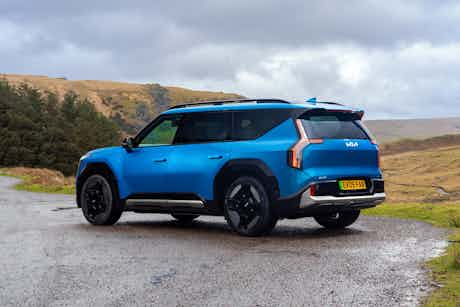Were consumers waiting for EV incentives in the Spring Budget?
March 14, 2024 by John Rawlings

As the dust settles on the Spring budget, Carwow, like many motorists, was disappointed March’s Spring Budget didn’t include any incentives from the government to make buying and running electric vehicles more attractive or affordable, particularly for private buyers.
- No incentives to buy EVs in Spring Budget
- Government EV incentives in other countries have stimulate private buyers
- Manufacturers introduce offers and discounts
The budget was a key opportunity missed for the government to boost slow EV sales to private consumers and build confidence in being able to charge them conveniently and at a reasonable price.
But now the dust has settled, and consumers know where they stand, will they go ahead and switch to an EV? Have manufacturers responded with their own incentives?
High hopes
In the run-up to the statement, there had been loud calls for VAT cuts to help those who can’t charge an EV at home by bringing down VAT on electricity at public charge points in line with cheaper domestic tariffs for electricity. It would also have been good to see help with the up-front cost of electric cars – both new and used – and support to grow the public charging network more quickly. These are critical issues when attempting to create confidence for mass adoption of EVs.
The VAT issue is one that’s long been heralded as an easy win – home electricity is at a 5% rate of VAT, but public charging providers pay 20%. Levelling that off would instantly make public charging more affordable.
Instead, all motorists got from the Chancellor of the Exchequer was the continuation of the 5p freeze on fuel duty for a further 12 months. Jeremy Hunt reckons this saves the average motorist £50 a year. That’s the equivalent of £4.17 per month. Forgive us if we don’t get too excited or sound ungrateful, but his one nod to motorists was continuing something already in place.
Polling opinion
Carwow’s pre-Budget poll showed 38% of motorists want to change to an EV, but 59% also said they wanted there to be more EV charging points.
Sadly, the Budget didn’t offer any support, financial or otherwise, towards the massive investment and planning processes required to install new charging stations. Consumers didn’t get the confidence in the charging network they wanted; and there was nothing to reduce the costs of electricity at public chargers either. Another disappointment.

EV sales
The number of private consumers buying EVs has continued to decline recently. Maybe (or hopefully) people have been waiting to see if the Spring Budget brought any EV incentives, or they were also waiting for the new 24-reg number plates in March. We’ll know the answer in the coming weeks.
In Europe, Government discount and scrappage schemes to encourage private buyers into EVs have proved successful. Examples include France’s ecological bonus incentive of between €5,000 to €7,000 and Italy’s National Purchase Subsidy of between €3,000 to €4,500 plus a scrappage bonus of between €2,000 to €3,000. Last year, Germany’s environmental bonus also included up to €4,500 for used EVs up to one year old, but they ran out of funding before the end of the year.
If consumers were hoping for that level of government support to be introduced in the Spring Budget, it would have been worth waiting for – but it didn’t happen.
Discounts and incentives
So, without anything coming from the government, is there any glimmer of hope for private EV buyers in the UK?
The ZEV (Zero Emission Vehicle) mandate requiring 22% of each brand’s sales to be EVs this year is already seeing manufacturers introducing low or 0% finance offers and generous deposit allowances – effectively a discount on the asking price.
Now that consumers know the government isn’t offering any other incentives, it means the market will have to respond instead and there’s no reason for private buyers to postpone changing their car.
As a car changing marketplace, Carwow constantly monitors the best offers for new and used cars, and there are already some big discounts available.
For example, the current 0% finance offers available on Carwow include plenty of EVs, such as: the Polestar 2; Lexus UX300e; Lexus RZ; MG; Hyundai Ioniq 5, Ionic 6 and Kona Electric; Jaguar I-Pace; Toyota bZ4X; Citroen e-C4, e-C4 X, e-Berlingo and e-Spacetourer; and the Peugeot e-208, e-2008, e-308, e-Rifter and e-Traveller. More offers are being introduced all the time.
March is a good month to get a deal as dealers try to hit their targets for the end of the first quarter of the year. For example, Carwow’s current new car deals show you can save up to £8,067 on an Audi Q4 Sportback e-tron, or lease a Polestar 2 from £390 per month.
The future
In the wake of the Spring Budget, it’s hard to predict how many private motorists will switch to an EV this year. We know not to expect government incentives, and with manufacturers going the extra mile and offering their own incentives, we really hope consumers have some certainty to help them make their next car-changing decision.
We’re optimistic that the proportion of private EV buyers will now increase, although they’ll mostly be those with the ability to charge at home where it’s more economical.
Consumers need more affordable EVs and there are cheaper models coming onto the market. Dacia’s announced its new Spring is only £14,995 which makes it the cheapest new EV in the UK by a long shot. MG and Citroen have also revealed the first details of some budget, compact EVs (no prices yet) and we look forward to more coming onto the market over the next year. Maybe the post-Budget world for private EV buyers is brighter than we first thought.















